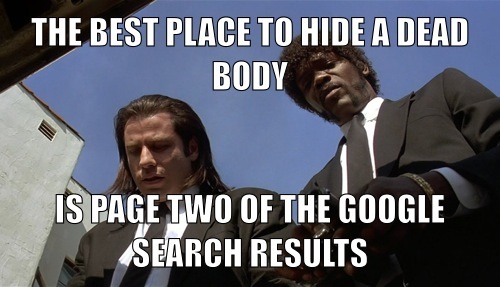How can your brand optimize your content to reach customers and achieve greater results?
According to Moz, over 70% of the traffic you earn for any given page will come from keywords you didn’t try to optimize for. Fifteen percent of all Google searches, over fifteen billion per month, have never been seen before–a monumental issue for marketers spending an exorbitant amount of time and money planning, designing and executing content marketing campaigns.
At the most recent Digital Summit in Dallas, Quinn Whissen of Vertical Measures expanded on this growing concern that brands are developing a massive amount of content and, through web analytics, are determining that what they are creating is not being seen by their customers. But there is hope for your organic search strategy! Whissen broached the topic by asking two simple questions to futureproof your SEO strategy:
Question 1: What keywords should your brand rank for, but are struggling to show up for on the results page?
Question 2: Which keywords can you add to the content or web pages that you already have to help your organic search rankings increase?
First things first. Audit your content.
Just because you search for content using a certain set of words does not mean everyone else does too.
(Photo Credit: Semantic SEO and the Future of Search & Keyword.Io)
Andy Crestodina, Co-Founder/Strategic Director of Orbit Media Studios, stressed the complexities of the future of SEO. His research found that just the keyword, “website footer” has almost 200 unique attached phrases coming up in searches, including “website footer template,” “website footer generator” and “website footer definition.”
The key to maximizing content is to utilize interchangeable terms within your personalized content copy to attract more readers and show up on the results page no matter the reader’s search phrase entered.
Whissen audited a piece of content that was shared after from a recent interview of Quentin Tarantino on the process of how one actress missed her shot at the big time to give us a better understanding to how you can update content copy to optimize your search results.
“Well, the way they pick TV shows is, they make one show. That show‘s called a pilot. Then they show that one show to the people who pick shows, and on the strength of that one show they decide if they want to make more shows. Some get chosen and become television programs. Some don’t, become nothing. She starred in one of the ones that became nothing.”
If his interview was anything like your website, you may rank well for the word “show,” but fail to reach your entire audience. Whissen recommends you have a clear topic, target term, create a list of “semantic terms” or words that are synonymous to the target term and another list of terms that are loosely related to the target term ready to pull from when auditing and tweaking your content.
Semantic terms help to make content more search-friendly
For this example the topic is the “Fall TV Line-up” and the target term being “shows.” Accompanying the target term are semantic terms such as “television programs,” “TV series,” “sitcom”, “episode” and “pilot.” Other related terms include: “season network,” “binge-watch,” “Netflix,” “NBC,” “drama,” “comedy” and “acting.”
“Well, the way they pick TV shows is, they make one episode. That show‘s called a pilot. Then they present that one episode to the network people who pick the fall TV line-up, and on the strength of that one installment they decide if they want to make a whole season of the TV series. Some get chosen and become television programs. Some don’t, become nothing. She starred in one of the ones that became nothing.”
Although the statement is still quite sad for the actress, the use of semantic terms allow readers looking for the web page with Tarantino’s interview on the Fall line-up much easier to find. With so many terms for search engines to pull from, the website is more likely to have the phrase the reader is using, adding relevance to the article and ranking higher on the results page.
Examples to get the juices flowing
You may be thinking that this all sounds handy if my brand posts interviews about television shows airing soon, but how do I apply this to my industry? I assure you, once you have the right template in place, the concept can work for any product page, on any website and in any industry.
To help you along your way to search engine optimization let’s look at how some of the biggest spenders in paid search can use semantic terms to enhance their rankings. AdventurePPC researched the top spending industries according to AdWords spend and found that the top two industries include: finance and insurance ($4.0 billion) and retailers and general merchandise ($2.8 billion).
Finance and Insurance
Topic: Plan for the Future
Target Keyword: Finance
Semantic Terms: Banking, Commerce, Economic, Investment, Business, Accounts, Money Management
Related Terms: Retirement, Settle, Cost, Endow, Vest, Capital, Budget, Wealth
The Tarantino Test:
“Well, the way customers arrange their finance is finding the right investment firm. Once they have financial confidence in their money management executive they can begin to plan for the future and set a budget for retirement.”
Retailers and General Merchandise
Topic: eCommerce
Target Keyword: Buy Our Product
Semantic Terms: Merchandise, Commodity, Craft, Assets, Goods
Related Terms: Style, Shipping, Specs, Accessories, Solutions, Materials, Return Policy
The Tarantino Test:
“Well, the reason customers choose to buy our product is because it helps them with accomplish their goal through our unique style and specs. Buy our product that is the solution available on our ecommerce website and if for any reason you want to say goodbye to our product, our return policy will pay the shipping back to our factory.”
How can you adjust your content to nail the Tarantino test?
(Photo Credit: Huffington Post)
Search Results Encourage Success
In a study done by the Chikita research firm, page one search results enjoy 95% of all traffic. Does that mean the end is near if you are on the second, third or fourth page of the search results? Not necessarily.
Start by taking a look at how you can audit your own content to maximize your search engine reach. Decide what your customers really want to learn by visiting your website and then target those specific phrases by applying them to the page. Don’t get too defeated if you find yourself on the second page of the results. You can always improve your content and move up the page. After all, it’s never too late to increase your search ranking with the right use of semantic terms.














Pingback: How to Gain Website Visitors When SEO is Performing Poorly - StartUp MindsetStartUp Mindset
Pingback: How to Jumpstart Your Google Analytics Account - StartUp MindsetStartUp Mindset